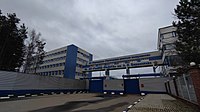You can help expand this article with text translated from the corresponding article in Russian. (May 2018) Click [show] for important translation instructions.
|
This article needs additional citations for verification. (May 2018) |
MKB Raduga (Russian: МКБ Радуга, meaning Raduga Design Bureau (Russian: машиностроительное конструкторское бюро «Радуга»), where raduga literally means "rainbow") is a Russian aerospace company, concerned with the production of various missile-systems and related technologies. It is headquartered in Dubna, Moscow Oblast. Formerly a division of the Mikoyan-Gurevich design bureau, it was spun off as a separate OKB (design bureau, Russian: опытно-конструкторское бюро) in March 1957.
 | |
 MKB Raduga facility in Dubna | |
Native name | МКБ Радуга |
|---|---|
| Formerly | OKB-2 |
| Industry | Aerospace |
| Headquarters | Dubna, , Russia |
| Products | Missiles, Cruise missiles, Air-launched cruise missiles, Anti-ship missiles |
| Revenue | $324 million[1] (2017) |
| Parent | Tactical Missiles Corporation |
History
edit- October 1946 - OKB-2
- 12 October 1951 - division of OKB-155-1 (headed by Mikhail Gurevich)
- March 1957 - Aleksandr Bereznyak became the chief designer
- June 1965 - machine building design bureau "Raduga"
- 19 June 1972 - Dubna production and development amalgamation "Raduga"
- 7 September 1978 - Dubna production amalgamation "Raduga"
- 12 May 1982 - machine building design bureau "Raduga"
Products
editKometa series
edit- KS-1 Komet (AS-1 "Kennel") - the first Soviet air-launched anti-ship cruise missile, began development 1947
- K-10S (AS-2 "Kipper") - heavy anti-ship missile, Tu-16, 1955
Naval P-Series
edit- P-15 Termit (SS-N-2 "Styx") - ship-launched cruise missile (the basis for the Chinese HY-2 Silkworm missile), 1955
- P-270/3M80 Moskit (SS-N-22 "Sunburn") - ramjet-propelled anti-ship missile, 1973, in-service 1984
Kh/KSR airborne series
edit- R-4/K-9 (AA-4 "Awl") - long-range air-to-air missile, late 1950s
- KSR-2 (AS-5 "Kelt") - 1956, Tu-16KSR-2
- KSR-5/Kh-26 (AS-6 "Kingfish") - Tu-16K-26, Tu-16KSR-2-5, Tu-16KSR-2-5-11. Development of Kh-22. Development authorized 24 August 1962. Officially entered service 12 November 1969 (along with K-10-26). Retired in 1994.
- KSR-11, (AS-5B) - anti-radar missile, air-launched. 1971
- Kh-15 (AS-16 "Kickback")) - hypersonic aeroballistic short-range attack missile, using liquid-fuel rocket propulsion. Tu-22M2,M3, Tu-95MS. First missiles were built in 1978. Serial production in mid-1980s.
- Kh-20 (AS-3 "Kangaroo") - air-launched cruise missile, Tu-95K. Development of "K-20 system" (consisting of Kh-20 missile, Tu-95K carrier, etc.) was authorized 11 March 1954.
- Kh-20M (AS-3 "Kangaroo") - Kh-20 with improved thermo-nuclear warhead. K-20 has officially entered service 9 September 1960. Retired in 1991 due to SALT-1 agreement.
- Kh-22 (AS-4 "Kitchen") - anti-ship missile, Tu-22K, Tu-22M, Tu-95K-22. Development of "missile complex K-22" was authorized 15 April 1958. Officially entered service 9 February 1971. K-95-22 (with Tu-95K-22 aircraft) entered service in 1987.
- Kh-28 (AS-9 "Kyle") - anti-radar missile
- Kh-32 - Tu-22M
- Kh-45 - Sukhoi T-4, Sukhoi T-4MS
- Kh-55 Granat (AS-15 "Kent") - cruise missile, 1976, Tu-95MS, Tu-160. Development was authorized 8 December 1976. The first serial Kh-55 was launched 23 February 1981. Officially entered service (complex of Kh-55 and Tu-95MS) 31 December 1983. Also Kh-101 /102 variant.
- Kh-58 (AS-11 "Kilter") - anti-radar missile
- Kh-59 Ovod (AS-13 "Kingbolt") - tactical air-to-surface TV-guided missile
- Kh-59M Ovod-M (AS-18 "Kazoo") -
- Kh-69
- Kh-2000, - Sukhoi T-4, Sukhoi T-4MS
Others
edit- 85R, 85RU, (SS-N-14 "Silex") - surface-launched torpedo-carrying anti-submarine missiles
- MV-1 - target drone
- KSR-5-NM - target drone
- Rk-55, S-10 Granat (SSC-X-4 "Slingshot", SS-N-21 "Sampson") - surface, submarine-launched nuclear cruise missiles
- Burlak, Burlak-M air-launched spacecraft launcher, Tu-160SK
References
edit- ^ "Рейтинг крупнейших компаний России по объему реализации продукции". Expert RA. Archived from the original on 28 October 2018. Retrieved 28 October 2018.